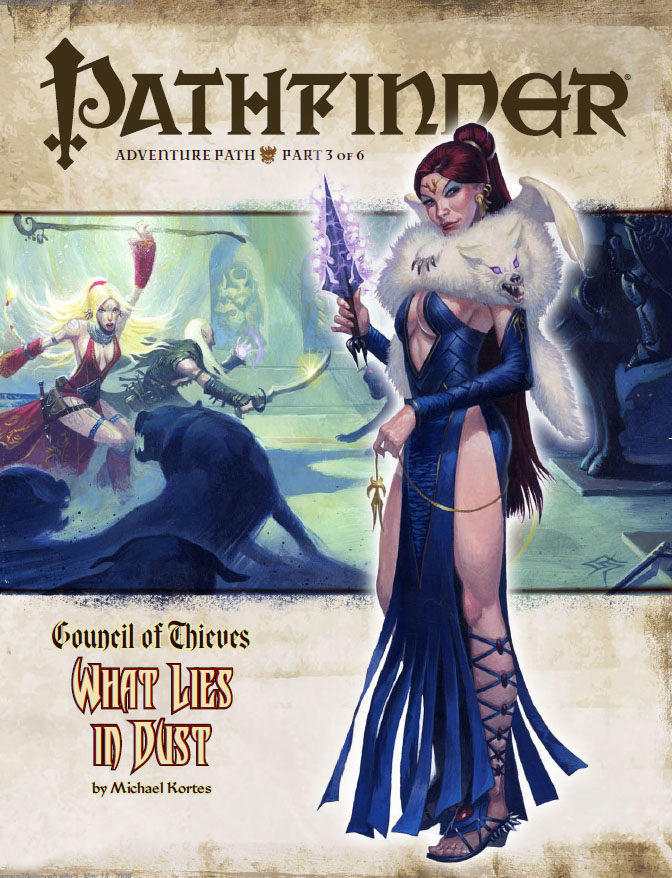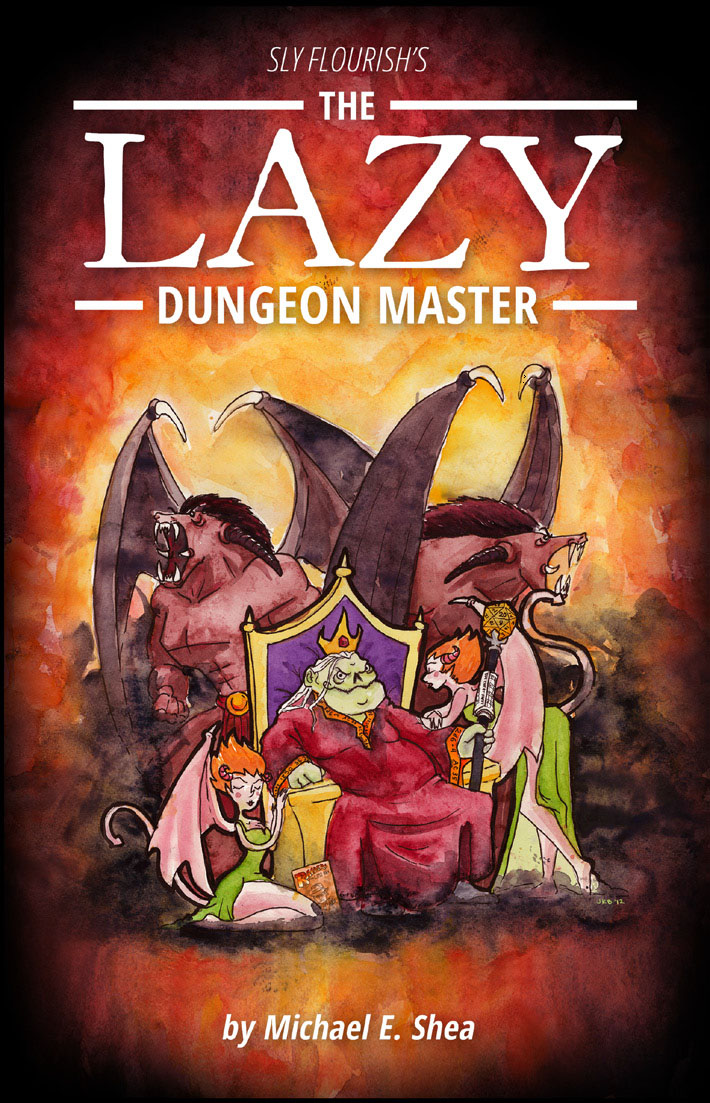Many GMs – possibly most of them – are bad at prepping.
This is true even of GMs who run good games. You’ll frequently hear the mantra that if everyone’s enjoying your game, then you’re doing it right! There are a number of problems with this belief (starting with the fact that enjoyment is not a binary property), but bad prep habits are a really important counterexample: If you’re spending fifteen hours prepping to get the same results that you could be getting with only an hour of prep, think about what you could be doing with those fourteen hours you’ve saved. (And not just in the rest of your life; think about the things you could be doing with that time that would make the experience of you and your players even better.)
LOW-VALUE PREP
Which brings us to probably the most common prep problem: GMs who burn themselves out with low-value (or no-value) prep. They either spend inordinate amounts of time prepping material which is never experienced at the table and/or they prep material which doesn’t actually enhance what’s experienced at the table.
One of the leading causes of low-value prep seems to be published scenarios. Most RPGs don’t include any meaningful advice on scenario prep, and the RPGs that do include such advice are generally inadequate or misguided (often being written by designers who are, themselves, engaged in bad prep; the problem is, after all, endemic to the hobby). It makes sense, therefore, that lots of GMs instead turn to published scenarios as an example of what they should be doing.
Unfortunately, published scenarios are a terrible example of what a GM should be prepping. And I’m including all of my professionally published scenarios in this condemnation.
First, even in an ideal case, what I need to write in order to clearly communicate the ideas in my head to someone I’ve never met is VERY different from the notes I need to run a scenario for myself. Here’s an actual quote from a homebrew scenario someone sent me for critique:
“There are eighteen goblins living in this rocky cavern, which is largely similar to the other caverns in this area. If it’s morning, the men will be asleep and the women will be cooking breakfast. If it’s afternoon, the men will have left, leaving only the women behind. In the evening, however, all of the goblins will be here. You should also carefully consider whether the PCs’ actions elsewhere in the dungeon have alerted the goblins to danger, in which case the men will either leave 1-2 of their number to protect the women during the day; or all may remain at home if the danger is seen as particularly acute.”
Leaving aside the profligate verbiage, who is the “you” in this text? If this is how you’re prepping your scenarios for your personal use, who are you talking to? You don’t need to explain your intentions to yourself.
Second, most published scenarios are bad. This isn’t really a surprising revelation (Sturgeon’s Law: 90% of everything is crap), but they’re often systemically bad in a way which collectively lead GMs to believe that scenarios are “supposed” to be prepped in a way which will also result in their scenarios being systemically bad.
Railroading is perhaps the most common example of this. But in terms of bad prep, the even more damaging example is Choose Your Own Adventure design, encouraging GMs to waste their time prepping elaborate flow charts filled with an ever-increasing amount of material that they know will never be used because it’s literally designed to NOT be used in its entirety.
Third, these problems have become increasingly exacerbated by the fact that a sizable portion of the audience reads published scenarios as a form of storybook pulp fiction instead of surveying them as a tool for creating memorable experiences at the gaming table. More importantly, the RPG companies know this and are writing their scenarios to satisfy this audience.
Here’s James Jacobs, the Creative Director at Paizo responsible for their Adventure Paths, on the subject:
Paizo more or less exists as a game company today (and not merely as an online RPG store) because adventures sell. If they’re done right. And by “right,” I mean “fun to read.”
Because I suspect the majority of adventures published by game companies are never actually played by most of those who read the adventures. (…)
And adventures, which tell stories, ARE fun to read. (If they’re built to be read.)
To be clear, I understand the meta-fictional appeal of reading an RPG scenario. There is a creative act of closure that takes place when reading a scenario and imagining how the situations it  describes might play out that’s a fairly unique (and enjoyable) experience. And I understand the commercial need to appeal to as broad an audience as possible in order to make your products profitable, particularly in an industry like RPGs where your sales will be anemic even at the best of times.
describes might play out that’s a fairly unique (and enjoyable) experience. And I understand the commercial need to appeal to as broad an audience as possible in order to make your products profitable, particularly in an industry like RPGs where your sales will be anemic even at the best of times.
The problem is that there are a number of things you can do as a writer to enhance the enjoyment of the reader that are actually inimical to the runner. And I’m increasingly seeing these elements in published adventures: Bloated descriptions. Material sequenced so that the reader is given a Shocking Reveal!™ instead of being sequenced for easy reference by the GM at the table. Narrative discourses and background information for which there is no clear vector for the players to ever learn of them.
Some writers do this because they are intentionally aiming for the reader market. Some writers don’t actually run adventures themselves and are writing for their own preferences as people who only read adventures. (This is shockingly common, and often encouraged by publishers who respond to the word “playtest” as if you had grown a second head.) And some writers are just following the examples they see in print from others, and which they have come to think of as the “correct” way to write up a scenario.
A lot of GMs follow a similar impulse to this final category of writers: They’re looking for an example to learn from in prepping to run their games, and the examples they’re using aren’t even primarily designed to run a game from in the first place.
LOW PREP
There has, in fact, been a backlash against low-value prep.
One particularly common form of this backlash are “low prep” or “zero prep” philosophies. You’ll find these in games specifically designed for such play, like Technoir or Lady Blackbird (along  with a metric shit ton of storytelling games like Ten Candles, Hillfolk, Fiasco, and so forth), but also presented as a more general philosophy about how traditional RPG scenarios can be prepared.
with a metric shit ton of storytelling games like Ten Candles, Hillfolk, Fiasco, and so forth), but also presented as a more general philosophy about how traditional RPG scenarios can be prepared.
These low prep strategies can be very effective, and have a great deal of utility in specific circumstances. (I’ve talked often in the past about the usefulness of having RPG experiences that can be picked up and played as casually as many board games can be, for example. Low prep systems are one way of achieving that.) But what it reveals for many long-time GMs is that their prep is bloated and ineffective and wasted. For some, their low-value prep is so bad that it actually has a negative value. Literally doing nothing results in better sessions than what they were doing before.
This leads some to believe that all prep is a bad idea. But this is an overreaction, trapping some GMs in a stunted ideology that can be just as limiting as the low-value prep they were practicing before.
Even in less virulent extremism, low prep philosophies can seductively convince GMs that they’ve solved a problem when, in fact, they’re only masking it: They discover that the prep they’ve been doing doesn’t work, so they do less of it and their games improve! All better, right? Problem solved!
Except they haven’t actually stopped doing the sort of prep that doesn’t work… they’ve just dramatically reduced the amount of it they’re doing. Eating less cyanide is good, but what you should really be doing is not eating cyanide.
 You can find an example of this in the first section of Michael E. Shea’s The Lazy Dungeon Master. The book preaches a good message about GMs wasting a lot of time on prep that doesn’t add value to their games, but the alternative structure it teaches is to prep four things, each on a 3×5 card:
You can find an example of this in the first section of Michael E. Shea’s The Lazy Dungeon Master. The book preaches a good message about GMs wasting a lot of time on prep that doesn’t add value to their games, but the alternative structure it teaches is to prep four things, each on a 3×5 card:
- A beginning scene.
- Three paths your game might take.
These paths can either be a Choose Your Own Adventure (where, after the initial scene, the PCs can choose one of the other three paths or, alternatively, none of them), in which case you’ll prep four things of which at least half of them will never be used. Or it can revert to a linear, pre-plotted sequence. But because the GM didn’t spend as much time prepping this linear, pre-plotted sequence, Shea’s argument is that it will be more likely that the GM will be willing to just throw it all out as wasted prep.
Shea recognizes that plot-based prep doesn’t work, but in the absence of any other paradigm, the only advice he can offer is to just do less of it.
SMART PREP
Which, ultimately, leads us to smart prep – the way to focus your prep on stuff with a high utility value while avoiding prep which is either unnecessary or likely to be wasted during play.
Whereas the goal of a low prep philosophy is to reduce the amount of time you spend prepping, that’s not the primary goal of smart prep (although it might be a side effect). When you’re practicing smart prep, the goal is to make sure that every moment you’re spending prepping is maximizing the positive effect that prep has on your game sessions. You might even end up spending more time prepping. For example, I spent dozens of hours prepping the Eternal Lies campaign, but the result included hundreds of props and visual elements that created a unique and memorable experience for everyone involved.
Smart prep is all about thinking long and hard about your prep methods to see if there are ways in which you could be achieving the same results (or better results) with less prep. (Or using the same amount of prep to achieve more.)
So let’s talk about what that looks like.













“Smart prep” is a concept I’ve mentioned from time to time on the Alexandrian. Back in 2012 I even tried to write an article about it (Technoir and Smart Prep), but I ended up kind of making a hash of it by focusing on a non-traditional system that most people weren’t familiar with.
(The awesomeness which is Technoir may have been the initial spur for my thoughts back then, but the problem was that virtually everyone reading the article was confused by the unique aspects of Technoir and thought I was advocating that what was smart prep for Technoir was, in fact, the way all games should be prepped.)
I’ve finally come back around to writing the sort of general introductory article the “smart prep” concept has really needed on the Alexandrian for years now. It collects a number of other thoughts that had been kind of floating free for a long while now, so you may recognize the content of some of the older Thoughts of the Day posts cropping up here (having finally found, I think, their proper context).
Aside from being too wordy, I don’t see the problem with that block homebrew quotation?
“You don’t need to explain your intentions to yourself.”
You never have a time when you have some notes, and you can’t remember why parts of them are written that way? They’re like commenting code. If you leave them carefully in parts that seem easy to misunderstand (say, note that the +1 here is to account for the comma), that can make it a lot easier to pick back up after making it.
Really pumped for part two on this. I’m always trying to figure out ways to get more from my precious prep time.
Seems like the link to Part 2 is dead… 🙁
Um… The link to the second part doesn’t work??? I want to learn the principles of smart prep please!
I am very much looking forward to the next installment of this series. I’m currently using the paradigm in Never Unprepared, which is a great book, but often gets me stuck on a step.
Glad people are excited for this one! Somehow it’s always the essays where I’m convinced that I’ve finally gone too dry and esoteric that seem to strike a chord here.
Next installment is scheduled for the 29th. Or you can read it now if you’re a Patreon backer.
Great article, and really eager to read the rest of it. I just read Sly Flourish’s book, and it’s actually great. I know you don’t want to pick on this book in particular, but I’d say it’s one of the best around about prepping rpg games. You’re right, of course, that he can be read as encouraging GMs to prep “choose your own adventure”. But in context, I’d say it’s more like prepping situations, and getting your creative juice flowing to help you improvise in play. Everything he says can be boiled down to “prep stuff that will help you react to what PCs do at the table, so that story emerges from play”. This is seriously fantastic advice.
@Colubris. I don’t want to start an argument, but I’d say that Never Unprepared is one of the worst GMing book on the market. I know I’m in the minority (everyone seem to love it), but I think the advice is useless. If you are interested, I wrote the only critical review about it on DrivethruRPG (sorry about the block of text there, the paragraphs disappeared for reasons I’m not privy to.) Back when I wrote that review, I was pissed at two things at once : the book itself, which was a big disappointment, especially because some tips Phil Vechione wrote on Gnome Stew were great. But I was maybe even more angry at the reviews, which were pretty much all very praisworthy and positive. Almost none of them were even mentionning some very obvious and objective flaws in the book (flaws that one could overlook while also loving the book, but flaws nonetheless).
Either the link for the second page isn’t working or the writer decided to apply the “no-prep” style of writing it.
On the subject of smarter, more parsimonious prep I can wholeheartedly recommend Never Unprepared https://www.enginepublishing.com/never-unprepared-the-complete-game-masters-guide-to-session-prep by Phil Vecchione.
I was wondering if this one could be added to the Gamemastery 101 page? I feel like this is going to be very important!
Love this and really excited for the future articles on this.
I’m prone to massive over-prep, which has been reduced thanks to following your advice over the years.
Would agree with Musashi – this series belongs in Gamemaster 101!
The broken link is intentional. This is not the first time he’s included a link to the next part of a series before the next part has actually been added to the website. It’s like “to be continued” at the end of a TV show.
What I’m sure *isn’t* intentional is that the link attached to the quote from James Jacobs doesn’t actually link to anything.
Fixed!
I was having a reread after passing the link on to the new game masters in my open table group. I felt a kind of itch to look at some old modules so i went and had a look at AD&D Adventure Pack 1 : Blood and Laurels which is the first adventure in the pack. It describes the annual games run by a king and the way characters can use the games to get something useful for whatever adventure they are playing.
However the synopsis tells the GM nothing about one of the competitors, Drusus and his deadly cheating. You know nothing about this till you get to the huge block of text about the third day of competition, where you find this text:
“The strongman has actually been the victim of the secret machinations of Drussus, a competitor from the nearby Alexandrian Empire.” It goes on to tell that Drusses sent thugs to drop the rocks and wants to win the game to marry a princess, kill her and ascend to the throne blah blah blah.
Not only would it have been nice to have the in for about Drusses up front and clear, but it would be good if all his henchman interventions resulted in clues that players could find and do something about. However the scenario railroads the player along, only allowing them a moment to denounce Drusses after he wins. And somehow the officials at the game suspect nothing despite all the sudden deaths of the finest competitors.
It reminded me why I don’t often use the vast treasure trove of adventures and side treks in the adventure packs and Dungeon magazine etc. They don’t have information organised for use in play and they are a drudge to read. I get adventure synopsis fatigue just reading the opening paragraphs.
I like the One Page Dungeons a fair bit https://www.dungeoncontest.com/ although they require some prep to inflate them for full use they reasonably act as a good “at a glance” dungeon key, with just the right level of conceptualisation for me.
Hi Justin! Great series, as usual. Could you put a linked Table of Contents here, like you do for the other series, please? Thanks!
[…] with low prep were Sly Flourish’s Return of the Lazy Dungeon Master, Hexcrawl’s The Alexandrian, and Alex Schroeder’s Hex […]
It’s interesting that you mention Mike Shea’s original book “The Lazy Dungeon Master”. His newest book, “Return of the Lazy Dungeon Master” is actually a better, more complete and more organized prep system. And he actually refers to your techniques quite a lot! One of the steps in Return of the Lazy DM’s prep process is “prep situations, not plots” which is a direct quote from your node-based scenario design articles! Return of the Lazy DM is a fantastic book, an even better read than the original. I think your methods are somewhat more detailed than his…some of his methods are a little too quick and simplistic for my personal taste. But I use your methods and his methods in combination, and it works really well.